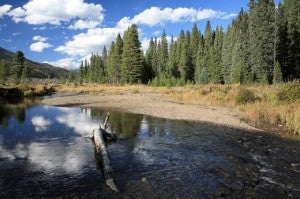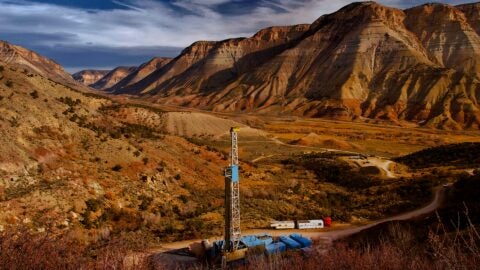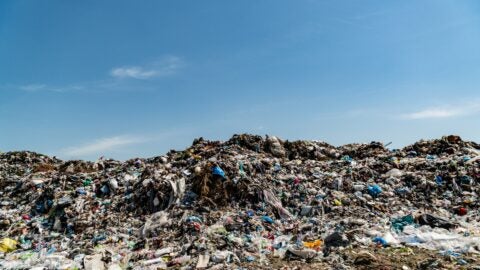Coloradans Overwhelmingly Voice Support for Proposed Air Regulations
 Colorado is the quintessential swing state – with voters split about evenly between Republicans, Democrats and Independents. That can make for some fractious politics at times, but our diversity is part of what makes us great.
Colorado is the quintessential swing state – with voters split about evenly between Republicans, Democrats and Independents. That can make for some fractious politics at times, but our diversity is part of what makes us great.
What makes us even better is our unity – and that’s what we saw today when, by a margin of almost 10-to-1, Coloradans of all stripes called on the state’s Air Quality Control Commission (AQCC) to adopt new rules that would slash air and climate pollution coming from oil and gas development activities.
The AQCC opened its hearings on the proposed rules with a full day of citizen input, with people traveling from around the state (one drove six hours) to make their voices heard. Residents from rural communities, including many from the Western Slope, stood up, one after another, to tell the AQCC Commissioners that the proposed rules should apply statewide and that the handful of local officials opposing the rules are out of step with the citizens they’re supposed to serve. In response to those local officials, one citizen from Ridgway implored the Commission to protect all Colorado families and not “turn the West Slope into an air quality sacrifice zone.”
EDF couldn’t agree more. Air quality in western parts of Colorado is trending in a bad direction, teetering on the edge of violating federal health standards. The state health department issued nine ozone advisories last winter for Western Slope counties where oil and gas development is prevalent, meaning the air wasn’t healthy for kids, the elderly, active adults and people with respiratory illness.
Some say we should wait until the U.S. Environmental Protection Agency declares Western Slope counties in violation of federal standards before we act to reduce pollution. That’s like waiting until you hit the ground before you pull the rip-cord on your parachute. We need to act now, rather than wait for air quality to deteriorate beyond any hope of control. Whether you live in Denver, Greeley, Durango or Grand Junction, all Coloradans deserve clean air.
Others are trying to delay action by complaining the proposed rules are “one size fits all.” But as one Gunnison resident noted, the proposal accounts for differences across producing basins by incorporating flexibility and a tiered approach for smaller emissions sources.
Residents also pointed to the economic importance of reducing pollution. They spoke about Colorado’s cornerstone agricultural industry and crippling damage to crops from emissions of volatile organic compounds (VOCs) from oil and gas activities. They spoke about Colorado’s outdoor recreation industry and its dependence on a clean environment. They spoke about high tech and clean tech industries that place a high premium on clean air and quality of life when deciding where to locate their businesses. They spoke about the terrible cost of wildfires, drought and invasive species – problems made worse by climate change – and called for controlling methane, a highly potent greenhouse gas that makes near-term warming worse. And high school students put their homework on the backburner to come down to the hearing, speaking to the Commission about the responsibility they have to future generations.

Oil and gas development is an important part of Colorado’s economy, but it can’t come at the expense of public health or the other economic engines in our state. Fortunately, that’s not the choice we’re faced with – despite what some would have us believe.
The fact is, the proposed rules are highly cost-effective. They would eliminate more than 90,000 tons of smog-forming VOCs every year – the same amount that’s produced by all the cars and trucks in Colorado – and would do so at less than 10 percent the cost the state is typically willing to impose on citizens and businesses to get pollution reductions. The rules would also remove more than 100,000 tons of methane annually through measures that can often pay for themselves in a few short years by making sure more natural gas goes into the sales line instead of the atmosphere.
We’re not saying the new rules will come at zero cost to industry. What we’re saying is, the costs are manageable and they’re worth it. Forward-thinking industry leaders agree. This proposal is supported by Noble Energy, Anadarko Petroleum, Encana Corporation and DCP Midstream – four of Colorado’s most important energy companies. These four companies will bear about 75 percent of the total statewide costs for these measures, but they say they’re supporting this rule because they know it’s the right thing for the environment and public health, the right thing for jobs and the economy and the right thing for their bottom line.
EDF was proud to work with these companies to help develop many of the ideas that went into this proposal. We think it was an example of Coloradans at our best – working through our differences and uniting us to bring common-sense solutions to tough problems. We Coloradans are diverse, but we are also united in our passion for our state and our environment.
The AQCC is scheduled to hear formal testimony on the proposed rule on February 20th and 21st, and possibly extending into the weekend.












